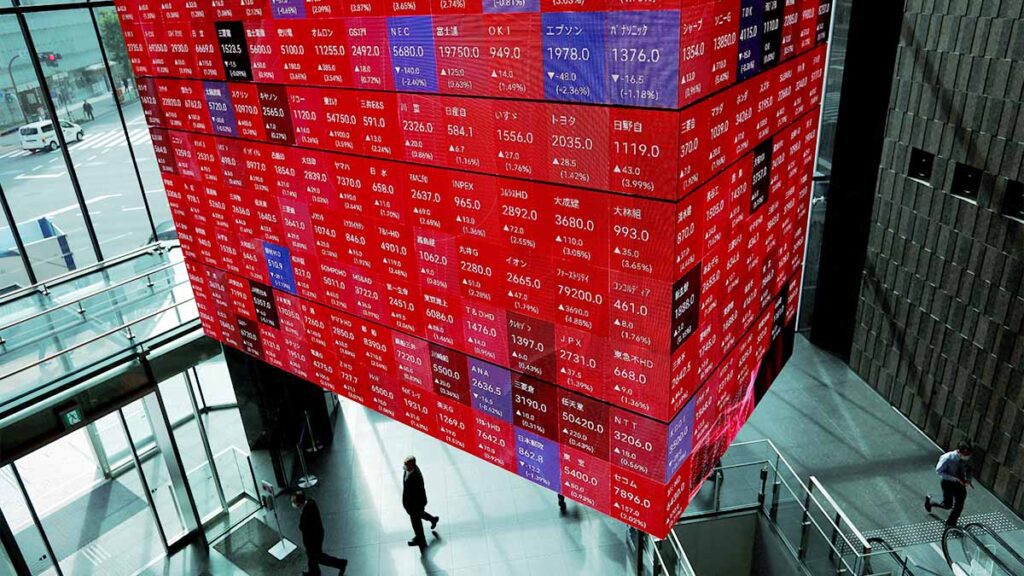Asian Shares Slip on Fed Officials' Hawkish Policy Stance

Asian shares took a beating on Friday after a fresh salvo of hawkish remarks from Federal Reserve officials solidified expectations that U.S. interest rates could rise as soon as March, leaving markets braced for tighter monetary conditions.
Fed Governor Lael Brainard became the latest and most senior U.S. central banker on Thursday to signal that rates will rise in March to combat inflation.
Equity markets turned deeply red, with MSCI’s broadest index of Asia-Pacific shares outside Japan shedding 0.9 percent in mid-afternoon trade, while Australia lost 1.1 percent and Japan’s Nikkei gave up 1.3 percent.
South Korean shares dropped 1.4 percent after the country’s central bank raised its benchmark rate 25 basis points to 1.25 percent on Friday, as expected, taking it back to where it was before the pandemic as it seeks to restrain consumer price rises.
China’s blue-chip index declined 0.5 percent and Hong Kong’s Hang Seng index was off 0.9 percent.
“Everyone is really nervous right now. It’s because everything is potentially going to come under pressure from aggressive Fed policy,” said Kyle Rodda, a market analyst at IG in Melbourne.
“There’s the hope that it’ll be a slow and painless handoff to normal policy,” he added. “But that’s not necessarily assured with the Fed taking inflation so seriously.”
Fed Governor Christopher Waller, who has repeatedly called for a more aggressive response to high inflation, later on Thursday said a rapid-fire series of four or five U.S. rate hikes could be warranted if inflation doesn’t recede.
U.S. inflation as measured by the consumer price index surged 7.0 percent in December, posting its biggest year-on-year increase in nearly four decades, data on Wednesday showed.
INFLATED ASSETS
In the bond market, yields on 10-year U.S. Treasury notes were at 1.720 percent, settling well off Monday’s two-year highs, signaling investors’ preference for the safety of government debt over volatile technology and growth stocks.
A Reuters report that Bank of Japan policymakers are debating how soon they can start an eventual interest rate hike helped drive up the yen and Japanese government bond (JGB) yields.
The five-year JGB yield hit -0.015 percent, its highest since January 2016, when the BOJ adopted negative rates.
The yen, which traditionally has drawn demand from flights to safety, last traded at 113.70 after hitting its strongest against the greenback in 3-1/2 weeks.
Separate data showed Japan’s wholesale inflation rose 8.5 percent year-on-year in December, accelerating at the second fastest pace on record, a sign higher raw material and fuel costs are squeezing corporate margins.
IG’s Rodda said markets were facing a more persistent risk of growing demand for safe-havens, especially around key events involving U.S. central bank policy and U.S. data.
“This is a problem because every asset has arguably been inflated by loose monetary policy,” he added.
“Every asset will have to correct to reflect higher or tighter monetary policy.”
The dollar index was down 0.1 percent at 94.638 after hitting a two-month low, pushed down by strength in the euro, which made a new two-month high at $1.1482.
In commodity markets, gold was 0.3 percent firmer at $1,827 an ounce but still below its January peak at $1,831.
Oil futures remained soft on expectations that Washington may soon act to cool prices that remain above $80 per barrel, while movement curbs in China to rein in COVID-19 outbreaks weighed on fuel demand. [O/R]
Brent was nearly flat at $84.49 a barrel, while U.S. crude lost 18 cents to $81.95.
